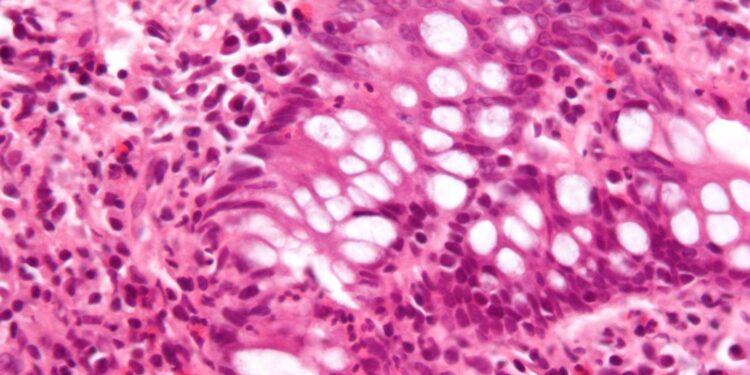Micrograph showing inflammation of the large intestine in a case of inflammatory bowel disease. Colonic biopsy. Credit: Wikipedia/CC BY-SA 3.0
Cleveland Clinic researchers have discovered a new bacteria that weakens the gut’s immune system, potentially contributing to certain inflammatory and infectious bowel diseases.
The team identified the bacterium Tomasiella immunophila (T. immunophila), which plays a key role in destroying a crucial immune component of the gut’s multifaceted protective immune barrier.
The identification of this bacteria is the first step towards the development of new treatments for various inflammatory and infectious intestinal diseases. These conditions, including inflammatory bowel disease, Crohn’s disease, and ulcerative colitis, are associated with decreased levels of secretory immunoglobulin A (SIgA), an antibody that protects mucosal surfaces.
The study, published in Sciencewas led by Thaddeus Stappenbeck, MD, Ph.D., chairman of the Department of Inflammation and Immunity at the Cleveland Clinic, and Qiuhe Lu, Ph.D., research associate and first author of the paper.
“Our research represents the critical role of a specific component of the gut microbiome in human health and disease,” said Dr. Stappenbeck.
“By identifying this specific bacteria, we have not only improved our understanding of intestinal diseases, but also opened a promising new treatment avenue. Identifying the culprit behind the breakdown of the gut’s protective adaptive immune barrier is an important step towards the development of much-needed therapies for conditions such as inflammatory bowel disease, Crohn’s disease and ulcerative colitis.
In the intestine, SIgA continually binds to microbes, preventing them from reaching and damaging body tissues. In previous research, the team found that gut bacteria could reduce SIgA levels, which could lead to an increased risk of infection and excessive inflammation.
In this new study, researchers found that the presence of T. immunophila in the gut increases susceptibility to pathogens and delays repair of the gut’s protective barrier. The name T. immunophila is a tribute to a pioneer in immunology. SIgA was discovered by Dr. Thomas Tomasi, who published his findings in a seminal paper in Science in 1963.
“The rigorous and elegant study by Drs. Stappenbeck and Lu provides a key insight and an exciting potential mechanism for why some people have low or absent levels of SIgA in their gut, while maintaining normal levels of SIgA in their bloodstream.” , says Michael Silverman, MD. , Ph.D., physician in the Division of Infectious Diseases, Children’s Hospital of Philadelphia.
Dr. Silverman, whose expertise includes immune system development, contributed to the research findings. “This finding is very important because SIgA in the gut functions as a critical part of the barrier against the billions of microbes that live in our guts,” Dr. Silverman said. “This study opens a new avenue for developing treatments to manipulate SIgA in the gut and improve health.”
“We know that a significant number of patients have this defect and are at risk of infection and inflammation of the intestine,” Dr. Lu said.
“We hypothesized that a gut microbe capable of degrading SIgA was the culprit. We believe that important therapeutic targets for various inflammatory and infectious diseases in humans may be discovered through our work.”
More information:
Qiuhe Lu et al, A host-adapted auxotrophic gut symbiont induces mucosal immunodeficiency, Science (2024). DOI: 10.1126/science.adk2536. www.science.org/doi/10.1126/science.adk2536
Provided by Cleveland Clinic
Quote: Researchers discover a new bacteria responsible for intestinal immunodeficiency (September 26, 2024) retrieved September 26, 2024 from
This document is subject to copyright. Except for fair use for private study or research purposes, no part may be reproduced without written permission. The content is provided for informational purposes only.



